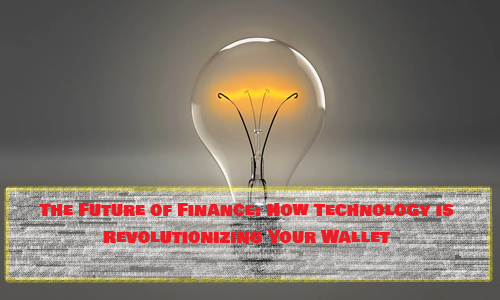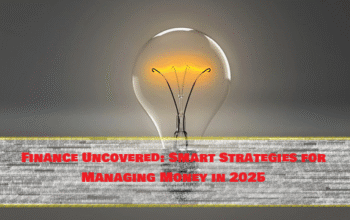The Future of Finance: How Technology is Revolutionizing Your Wallet
The world of finance is undergoing a profound transformation. As we move deeper into the 21st century, technology is reshaping how we earn, spend, save, and invest money. Your wallet, once a simple leather fold of cash and cards, is rapidly evolving into a digital ecosystem powered by smart devices, AI, and blockchain. This revolution is not just about convenience; it’s about fundamentally changing how people interact with money, empowering greater control, security, and financial inclusion.
In this blog, we explore the future of finance and how technology is revolutionizing your wallet in ways that matter — for today and beyond.
The Digital Wallet Takes Center Stage
The first wave of change has already arrived with the widespread adoption of digital wallets such as Apple Pay, Google Pay, and Samsung Pay. These platforms replace physical cash and cards with smartphones or wearables, enabling contactless payments, faster transactions, and seamless integration across services.
- Convenience: No need to carry multiple cards or cash — your smartphone holds it all.
- Security: Digital wallets use tokenization and biometric authentication, making payments safer than traditional cards.
- Integration: Many digital wallets link to loyalty programs, tickets, and even identification documents.
What’s next? Expect wallets to become even more intelligent, integrating AI assistants that can manage spending, suggest savings, and automate payments — all personalized to your habits.
Artificial Intelligence: Your Personal Finance Assistant
Artificial Intelligence (AI) is the engine behind many revolutionary finance technologies today. AI’s ability to analyze massive amounts of data and learn from behavior means your wallet is becoming more than a payment tool — it’s a financial advisor.
- Budgeting and Expense Tracking: AI apps automatically categorize expenses, detect unusual spending, and offer tailored saving tips.
- Investment Guidance: Robo-advisors use AI to build and manage personalized investment portfolios based on your goals and risk tolerance.
- Credit Monitoring: AI detects potential fraud or credit score changes and suggests actions to protect your financial health.
The future wallet will likely come embedded with AI-powered chatbots that proactively communicate with you — reminding bill payments, negotiating better deals, or alerting you to financial opportunities.
Blockchain and Cryptocurrencies: Reimagining Money
Blockchain technology and cryptocurrencies are redefining the very concept of money and how it moves across the globe.
- Decentralized Finance (DeFi): DeFi platforms use blockchain to create financial services — lending, borrowing, trading — without traditional banks. Your wallet could become your entire bank branch, accessible anywhere.
- Digital Currency Wallets: Beyond Bitcoin and Ethereum, governments are experimenting with Central Bank Digital Currencies (CBDCs), which could be integrated into digital wallets, offering faster and cheaper transactions.
- Ownership and Transparency: Blockchain provides secure, transparent transaction records, reducing fraud and increasing trust.
For users, this means more control over money, fewer intermediaries, and the ability to participate in a global financial ecosystem directly from their digital wallets.
Biometric and Behavioral Authentication: The Future of Security
As wallets digitize, securing them becomes paramount. Traditional passwords are giving way to biometric and behavioral authentication.
- Fingerprint and Facial Recognition: Smartphones and wearables already use these technologies to unlock devices and authorize payments.
- Behavioral Biometrics: Advanced systems analyze how you type, swipe, or even hold your phone to verify identity continuously.
- Multi-Factor Authentication (MFA): Combining biometrics with device recognition and location data ensures that your wallet stays safe even if one factor is compromised.
This layered security approach ensures your money is accessible only to you, reducing fraud risk dramatically.
Embedded Finance: Banking Disappears into Everyday Life
Embedded finance is the trend where financial services are integrated directly into non-financial platforms and apps, making money management invisible and seamless.
- Buy Now, Pay Later (BNPL): Retailers embed financing options at checkout, allowing consumers to split payments without leaving the store’s app.
- In-App Banking: Social media platforms and messaging apps are integrating payment and banking features, enabling peer-to-peer transfers, bill payments, and even savings goals.
- Subscription Management: Apps now automatically manage your recurring payments, alerting you to upcoming charges or unused subscriptions.
Your wallet will no longer be a separate app but a feature woven into all the digital experiences you use daily.
Financial Inclusion: Technology Bridging the Gap
One of the most profound impacts of technology on finance is its potential to increase financial inclusion worldwide.
- Mobile Money in Emerging Markets: Platforms like M-Pesa in Africa have brought banking to millions who previously had no access.
- Microloans and Crowdfunding: Digital platforms enable small-scale lending and fundraising, supporting entrepreneurs and individuals globally.
- Affordable Investment Platforms: Fractional investing and zero-commission trades allow more people to build wealth regardless of income.
Technology-powered wallets can democratize finance, giving everyone tools to participate in the economy and build their financial future.
Environmental Impact: Green Finance in Your Wallet
Sustainability is becoming central in financial decisions, and technology is helping integrate environmental impact into wallet choices.
- Carbon Footprint Tracking: Some apps analyze your spending habits and estimate your carbon footprint, encouraging greener choices.
- Green Investments: Digital wallets increasingly offer easy access to ESG (Environmental, Social, Governance) funds and green bonds.
- Paperless Transactions: Digital wallets reduce the need for physical receipts and cards, contributing to lower environmental waste.
As consumers demand more responsible options, your wallet could guide you toward choices that support a healthier planet.
Challenges and Considerations
While technology revolutionizes wallets, it also brings challenges:
- Privacy Concerns: Digital wallets collect vast amounts of data. Protecting user privacy and managing data ethically is crucial.
- Digital Divide: Access to smartphones and reliable internet remains uneven globally.
- Regulatory Hurdles: Governments are still adapting to cryptocurrencies, data security, and cross-border payments.
- Overdependence on Technology: Technical glitches or cyberattacks could disrupt access to funds.
Users must stay informed, practice good security hygiene, and advocate for inclusive policies to mitigate these risks.
Preparing for the Future Wallet Today
Here are actionable steps to embrace the future of finance technology:
- Adopt Digital Wallets: Start using trusted digital payment platforms and explore features like loyalty integration and budgeting.
- Leverage AI Tools: Try budgeting apps with AI and robo-advisors to optimize your finances.
- Experiment with Crypto: Educate yourself on blockchain and consider small, informed crypto investments.
- Enhance Security: Use biometric authentication and enable multi-factor security on all financial apps.
- Stay Informed: Follow fintech trends and regulatory changes to adapt your financial habits.
By proactively engaging with these technologies, you can unlock new levels of convenience, control, and financial opportunity.
Conclusion: Your Wallet, Transformed
The future of finance is digital, intelligent, and inclusive. Your wallet will evolve from a static container of cash and cards into a dynamic, AI-powered, blockchain-secured personal finance hub. This transformation promises not only ease and security but also greater empowerment to manage your money smarter.
Technology is revolutionizing your wallet — are you ready to embrace the future and redefine your relationship with money?



